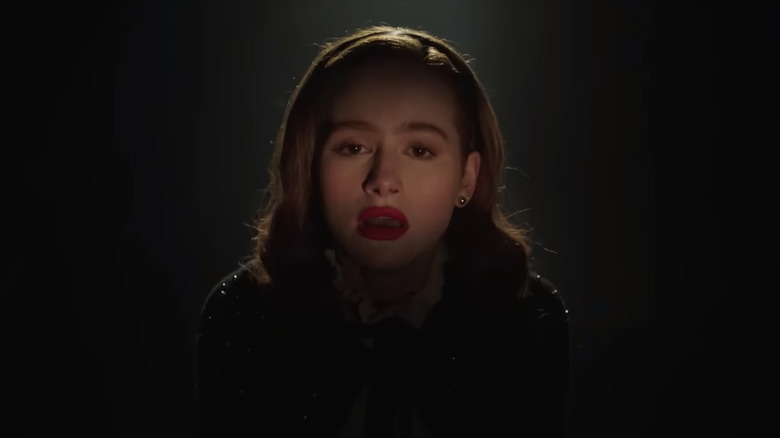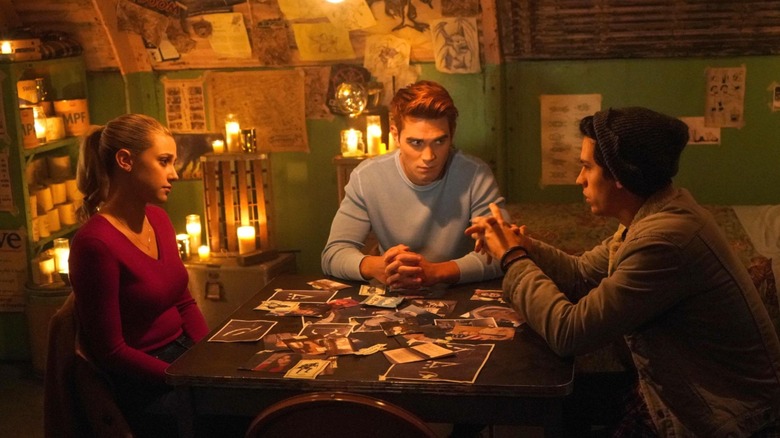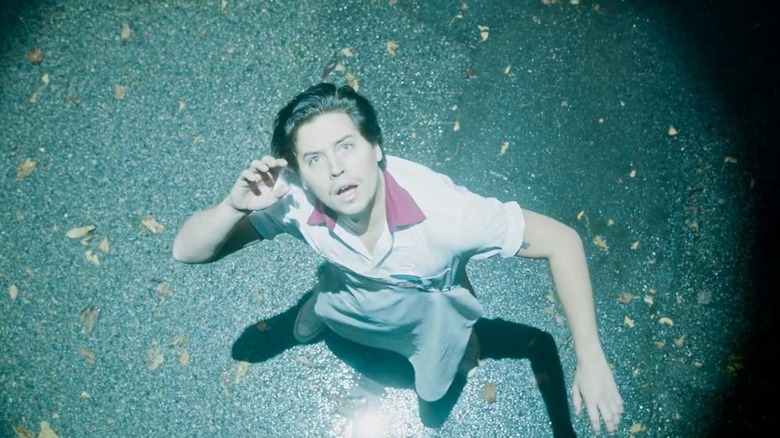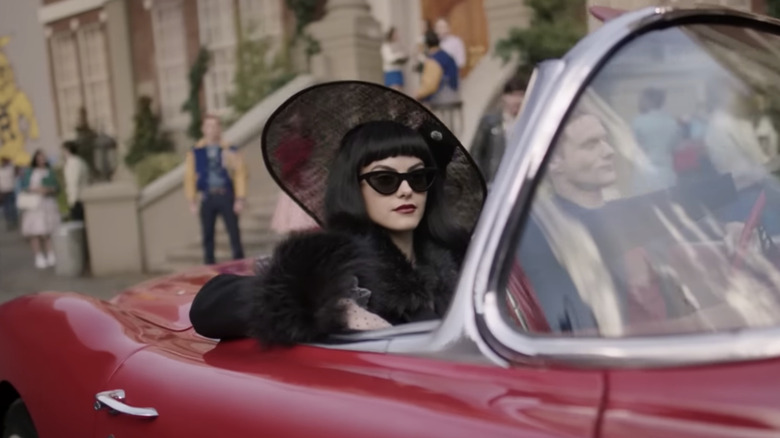Why Riverdale Is The Twin Peaks Of Its Time — No, Seriously
This might be controversial for me to say, but "Riverdale" is going to go down as the most misunderstood show in television history. The CW series may be the campiest media of all time, but most of the people who would love this sort of show have written it off as a silly teen soap. What started as a murder mystery tribute to "Twin Peaks" has since unraveled into interacting alternate universes and supernatural forces. The series has had one clear thesis from the very beginning: to constantly one-up the absurdity. It wouldn't be fun unless it was disguised as another tween drama, but I'm here to prove once and for all that every brushstroke of the masterpiece that is "Riverdale" is 100% intentional tongue-in-cheek camp.
The beloved Archie comics from the mid-century American imagination provide a loose basis for the series, but the characters grow so absurdly distant from their origins that their two-dimensional memory is called upon only for humor. The show kicks off with a murder that parallels Laura Palmer, along with a student-teacher affair and some heavy hints at incest — all in the first episode. It's obviously insane to imagine that the wholesome American teenagers from the Archie comics would be wrapped up in a world of sex and crime, and that's pretty much the point.
The death in the pilot isn't the only part of the series that takes influence from "Twin Peaks." The series takes a lot of influence from David Lynch's critically acclaimed crime show, and in more ways than the viewer might realize. "It's incredibly 'Twin Peaks'-y," series creator Roberto Aguirre-Sacasa said in a 2016 interview with TVLine. "We use 'Twin Peaks' as an inspiration a little bit [...] and we have Mädchen [Amick], so it's really 'Twin Peaks!'"
It's directly inspired by Twin Peaks
"Riverdale" isn't often compared to "Twin Peaks" because it looks just like any Netflix original on the surface, with bisexual lighting and a stuffy in-studio quality. The comic-book-like hyperreality of Netflix's aesthetics is a nod to the characters' origins, and the cartoonish texture reminds the viewer that the "Riverdale" universe is not bound to the laws of reality. "Twin Peaks" departed from aesthetic convention in the first season with the White Lodge, while "Riverdale" promises to take a more cinematic turn in its final season.
The characters on the show take the ridiculous plot points and theatrical dialogue very seriously, much like James and Donna on "Twin Peaks." But the characters aren't the only ones that take the show at face value — the general public does as well. "Riverdale" is often ridiculed for its bad writing in Youtube compilations. I'm sorry, but there's no way that a writer who was taking the show's dark subject matter with a straight face would name Riverdale's popular street drug "jingle jangle."
Unrealistic dialogue may be only a small part of the series' overall commitment to ridiculousness, but it is a perfect encapsulation of its campiness and departure from realism. The genius of these lines, as with the show itself, lies in the disparity between the accepted, lived reality of human experience and the limitless reality of "Riverdale." Parents oscillate between serial killers and heroes, multiple cults take over the town, mass seizures break out, alternate universes rip open the space-time continuum, everybody gets superpowers, and there's a musical episode every season.
The campiness is completely intentional
Critics assume that the writers and actors on "Riverdale" are unaware of the show's over-the-top nature as if they aren't creating it on purpose. It gives them very little credit but, more importantly, I can prove that it isn't true — straight from the mouth of one of the main cast members, Cole Sprouse, who plays Archie's outcast best friend Jughead.
"Here's what's tricky," he offered in a 2017 interview with TVLine. "Is that this is a show that knows the camp it sells. We understand the sort of genres that we're fitting into and how to appeal to that audience, but everyone in the universe takes it super seriously — it's not a joke." So there you have it, "Riverdale" is completely self-aware. Just like "Twin Peaks" was totally misunderstood when it came out, only to later develop a cult following, I firmly believe that "Riverdale" will be fondly remembered and experience a critical renaissance years after it stops airing. Allow me to be the first of many to sing its praises.
The series enters its seventh and final season at the end of March 2023, and everyone who's stuck around since the beginning knows to expect the unexpected by now. The latest gag is a time jump into the 1950s, the same era in which the original comics were set. It promises to be the most cartoonish, over-the-top, and aesthetically appealing season yet. But one question remains: why is the show still being taken at face value by the general public?
But why is it so misunderstood?
The CW's genius series "Riverdale" isn't considered a surrealist masterpiece like "Twin Peaks" because it doesn't present itself as such. And it isn't just surrealist, it's what film theorist Gilles Deleuze might call "naturalistic," a word that he defines in his book "Cinema 1" as being "not opposed to realism, but on the contrary, it accentuates its features by extending them into an idiosyncratic surrealism."
"Riverdale" writers test the boundaries of the show's universe constantly, and the only natural conclusion was for these boundaries to entirely rip apart. The final departure from narrative inhibitions was marked by a bomb exploding and launching the characters into an alternate dimension in season 5. Eventually, both dimensions begin to fall apart and bleed into one another. As Deleuze aptly points out, "naturalism could only grasp the negative aspects of time; attrition, degradation, wastage, destruction, loss, or simply oblivion."
I've watched thousands of movies and television shows, but only a select few have filled me with pure ecstatic joy. "Riverdale" and "Twin Peaks" tickle that same exact part of my brain, the same one that loves the extreme campiness of "Showgirls" and "Cry-Baby" or the tongue-in-cheek comedy of "Welcome to the Dollhouse." I'd put "Riverdale" among my favorite series any day, and it's about time critics started taking it seriously. Even though it's entering its final season, I trust that even now, seven seasons in, it won't fail to shock and delight me. Can you say the same for your favorite show?



